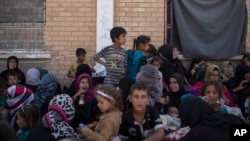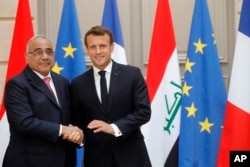Iraq is expected to make a formal request to Paris for financial support for the incarceration of French Islamic State suspects sent to Baghdad from Kurdish-controlled camps in northern Syria, say diplomats.
Fourteen alleged French jihadists have been sent to Baghdad for trial — they are likely to be joined by dozens of other French detainees. Other Western countries are also expected to take up the option to have their nationals, currently held by U.S.-backed Kurdish-led forces, sent to Iraq, thus avoiding having to repatriate them.
The Iraqi government hopes to get up to $2 billion in compensation from Western countries for trying their nationals, say analysts. An estimated 1,000 Western fighters are thought to be in the custody of the Kurdish-led Syrian Democratic Forces, who have been urging, along with U.S. officials, for Western states to repatriate them and to put them on trial in their home countries.
French President Emmanuel Macron has pledged more political and financial assistance to Iraq. The French leader announced a “new strategic roadmap” after meeting Iraqi Prime Minister Adil Abdul-Mahdi at the Elysee Palace, saying at a press conference Friday that France is ready to assist Iraq in reconstruction.
“The French development agency will soon set up in Baghdad with increased resources to help you,” Macron announced.
Financial compensation request expected
Macron did not address publicly the issue of foreign IS fighters, but French officials say Abdul-Mahdi and the French president did discuss them. Baghdad has not yet submitted a financial compensation request but is expected to do shortly, acknowledge French officials.
More than 3,000 foreign IS wives and their children are also being held by the Kurds, including U.S.-born Hoda Muthana, who has been barred from returning to the United States on the grounds that she has no right to American citizenship. According to the State Department, her Yemeni father held diplomatic status when she was born, a claim denied by the girl’s family.
As many as 1,700 French nationals are estimated by French authorities as having fought alongside jihadists. About 300 are thought to have died in combat.
The question of what to do with surviving foreign IS recruits — especially IS brides, many of whom were teenagers when recruited — has become a major international crisis, prompting diplomatic rifts amid rising concerns the recruits and their wives represent a collective security risk if left in Syria, but also individual security threats if returned to their home countries.
Western governments say putting them on trial will be difficult as prosecutors will not be able to gather sufficient evidence for convictions.
The Kurds have warned they cannot keep the recruits much longer. U.S. officials say there is a high risk they will escape from refugee camps and detention facilities in northeast Syria and pose a greater threat unsupervised.
IS foreign recruits on trial
But rights groups are alarmed by the trials of foreign IS recruits that have started to get underway in Iraq. They say the trials depend too much on circumstantial evidence and sometimes on confessions secured under torture.
Meanwhile, the families of Islamic State recruits in several Western states are campaigning for their IS relatives to be repatriated to their home countries and either prosecuted or placed in a de-radicalization programs.
Last month, German relatives of IS recruits demonstrated outside the foreign ministry, urging Berlin to repatriate at least the wives and children of fighters held by the Kurds.
They brandished banners reading: “Children are not responsible” and “Innocent German children will die.”
But last month, a legal tribunal in France dismissed appeals by families for their relatives to be re-admitted. The lawyer for one of the families seeking a Council of State ruling denounced the decision as “a denial of justice.”
France’s interior minister, Christophe Castaner, has said there will be “no communal repatriation," but French authorities will study “case-by-case” whether the children of French jihadist recruits should be allowed to be repatriated.
Issue of children
In December, a Belgian judge issued an order for the repatriation of half a dozen children under the age of six and their Belgian mothers from a Kurdish-controlled camp in northeast Syria. An estimated 160 children of Belgian origin are in Kurdish-controlled camps.
There's little sympathy in their home countries for the plight of IS recruits held in northern Syria — even for IS brides. The predicament of surviving young foreign IS recruits — especially of the women, most of whom left as schoolgirls without family approval or prior parental knowledge — has sparked a ferocious moral, political and legal debate in Britain about repatriation.
Rights groups say most of the women who left Europe to join the militant groups in the Levant should be seen as victims rather than criminals, arguing many were misguided or groomed.







